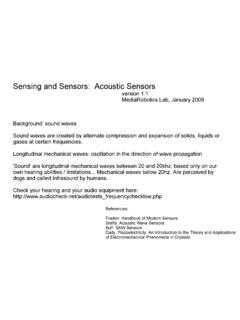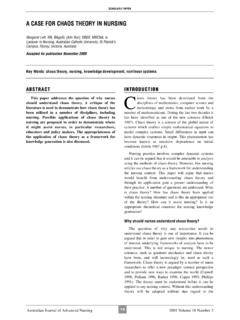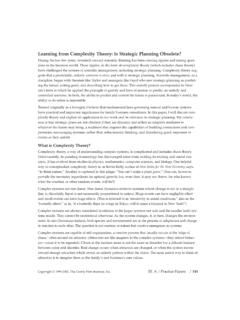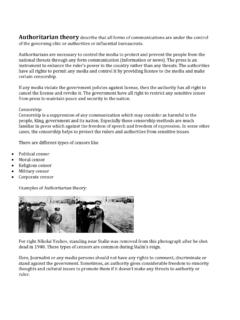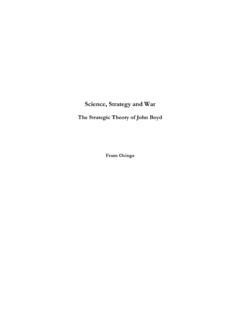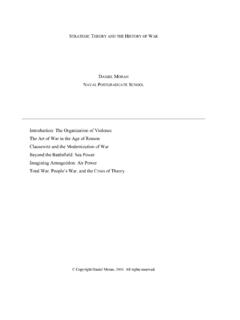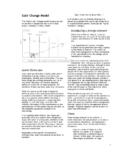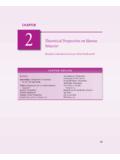Transcription of THE POLITICS OF CHAOS THEORY - RealTechSupport
1 THE POLITICS OF CHAOS THEORYThis chapter will examine the political implications of the literary and cultural interest inchaos THEORY and the scientific response to this. To critics like Hayles and Lyotard,deterministic CHAOS is a concept that has significant metaphorical and mythologicalconnotations for literature. Some scientists accept and support literary interpretations ofchaos THEORY , but most view its appropriation in a negative and anxious light and opposeits transvaluation into literature. The literary use of CHAOS THEORY has disturbed science smetaphorical equilibrium by expanding the applicability of CHAOS THEORY and hassubsequently become a controversial subject within science. The controversysurrounding literary interpretations of scientific ideas known as the science wars is aprominent theme in contemporary cultural first section of this chapter will examine critical claims regarding theepistemological status of CHAOS THEORY .
2 David S. Porush, William R. Paulson, PeterStoicheff, and Philip Kuberski advance individual though complementary arguments thatthe convergence of postmodernism and CHAOS THEORY necessarily incorporates theconvergence of their epistemological authorities. They use the idea of the convergence ofchaos THEORY and postmodernism to appropriate the epistemological authority of scienceso that they can authoritatively examine the chaotic nature of reality through claims to science s epistemological authority via CHAOS THEORY culminate inPaulson s assertion in The Noise of Culture (1994) that literature is equivalent to chaostheory in its ability to examine and explain chaotic phenomena. Implicit in this claim isthe idea that fictional and literary worlds are as important as the real world and asworthy of study.
3 The ideas summarised in this section provide the essential context forthe substance of this chapter - the debate between science and literature regarding thenature of CHAOS THEORY and its applicability to second section will examine how literary criticism has come to view thediscourse of CHAOS THEORY as fragmented and politically motivated. Hayles argues that88 The Literary Appropriation of CHAOS THEORY the history of CHAOS THEORY has scarcely begun to be written, [but] it has already becomeproblematic. 1 She suggests that deep philosophical divisions exist within CHAOS THEORY ,and that these divisions indicate that it does not represent a unified grand narrative ofscience but a cultural discourse with explicit political characteristics.
4 Hayles argues thatthere are two distinct groups within CHAOS THEORY : the first group, led by Ilya Prigogine,supports the interpretation of its ideas; whereas the second group, comprised of anumber of American chaologists, firmly opposes such developments. Porush focuses onone manifestation of this fragmentation - the exclusion of Ilya Prigogine from much ofthe North-American CHAOS THEORY literature - and argues that scientists who acknowledgesimilarities between CHAOS THEORY and the humanities are treated with suspicion andhostility by their fellow scientists and become isolated from the political centre of chaostheory because of their views. Prigogine s methodology - which combines scientificresearch and philosophical speculation - is a striking example of the interdisciplinarypossibilities of the worldview of CHAOS THEORY , yet it is considered by scientists like Grossand Levitt to conflict with the purported objectivity and methodological purity idea that science is an objective discipline that must isolate itself from socialconcepts like constructivism and relativism in order to function is dismissed by Porush,who notes that those who maintain the canons of objectivity and impersonality are stillhostile to alternative approaches to the practice of He asserts that personal andpolitical reasons, rather than academic reasons.
5 Explain why Prigogine has beenpositioned on the periphery of CHAOS THEORY by some of his colleagues. With reference toGaston Bachelard s perception of scientific discourse, Andrew Gibson argues in Towardsa Postmodern THEORY of Narrative (1996) that science constantly resorts to theimagination and traffics in the world of images, in a discourse that is radically other tothe discourse that it tells us is its own. 3 A literary interpretation of the discourse ofchaos THEORY indicates that it does not differ substantially from the subjective standardsand modes of other Hayles, CHAOS and Order, p. Porush, Making CHAOS , pp. Andrew Gibson, Towards a Postmodern THEORY of Narrative, Postmodern THEORY Series, Edinburgh:The POLITICS of CHAOS THEORY 89 The third section will examine how literature s use of CHAOS THEORY has beenviewed by scientists.
6 In his Introduction to Prigogine s and Stenger s Order out ofChaos Alvin Toffler argues that the principles of CHAOS THEORY have at least analogicalsignificance for society, and that science is currently engaging in a new withsociety. 4 In contrast, scientists like Paul R. Gross and Norman Levitt argue in HigherSuperstition: The Academic Left and Its Quarrels with Science (1994) that CHAOS theoryhas at most metaphorical significance for the humanities, and that claims made about itsrelevance to social systems are exaggerated and almost wholly unsubstantiated. Thedebate within CHAOS THEORY concerning its philosophy, methodology, and interdisciplinaryimplications, and the corresponding clash between those who claim to represent scienceand the humanities concerning the literary use of CHAOS THEORY , are examples of the science wars.
7 Literature s use of CHAOS THEORY has been interpreted within science as anattack rather than as a form of genuine interest. This section will consider science sresponse to this supposed attack, and how literature has in turn responded to thescientific critique of its use of CHAOS section will examine claims made by critics regarding the epistemologicalimplications of the application of CHAOS THEORY to literature. William R. Paulson, PeterStoicheff, David S. Porush, and Philip Kuberski counter Hayles cautious interpretationof CHAOS THEORY by proposing two radical ideas: firstly, that CHAOS metaphors may bedirectly applied to novels and other literary texts; and secondly, that postmodernliterature s epistemology, like that of CHAOS THEORY , exceeds the epistemology of modernscience.
8 Although these critics maintain that the analogous description of literary ideas inrelation to CHAOS THEORY is important, they also submit that CHAOS THEORY may be applieddirectly to texts by defining them as models of chaotic systems. Porush contends thatnarratives possess at least as much epistemological potency as modern science, thatmetafictions are able to describe complexity as coherently as CHAOS THEORY , and that theyEdinburgh University Press, 1996, p. The Literary Appropriation of CHAOS Theoryare therefore analogous to CHAOS THEORY in that both describe reality more effectivelythan modern s ideas are represented in a series of overlapping papers. Making CHAOS :Two Views of a New Science (1990) provides contextual information and outlines howliterature has received the ideas of Ilya Prigogine.
9 Prigogine, CHAOS , and ContemporaryScience Fiction (1991) examines how the theme of CHAOS THEORY is represented inscience fictions. Fictions as Dissipative Structures: Prigogine s THEORY andPostmodernism s Roadshow (1991) further examines the material from Making CHAOS . Literature as Dissipative Structure: Prigogine s THEORY and the Postmodern CHAOS Machine (1992) is theoretical and does not engage in a critical discussion of thefictional representation of CHAOS THEORY : rather, it examines its use in literary criticismand its implications for literary argues that modern science possesses a very limited capacity to describecomplex phenomena, and that CHAOS THEORY is far more suited to this purpose.
10 Porush isconcerned with demonstrating that fictional texts are chaotic and follow the same formsof chaotic order as other open systems. He argues that narratives and CHAOS THEORY referto similar principles and concepts to describe the world. His appropriation of chaostheory is designed to accommodate literary texts within the set of systems which may bestudied by CHAOS THEORY . It is for this reason that he claims in Fictions as DissipativeStructures that the postmodern novel is at a point in the evolution of literary techniquethat it actually is able to reflect and capture how phenomena like the mind or socialorganisation of human decision-making processes or traffic work. 6 Complex systemslike social organisation and traffic are commonly studied by chaologists and areconsidered typical examples of chaotic systems.
